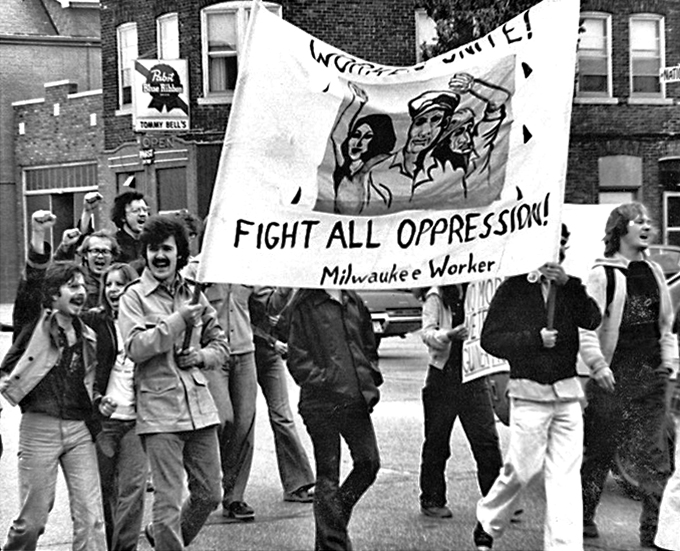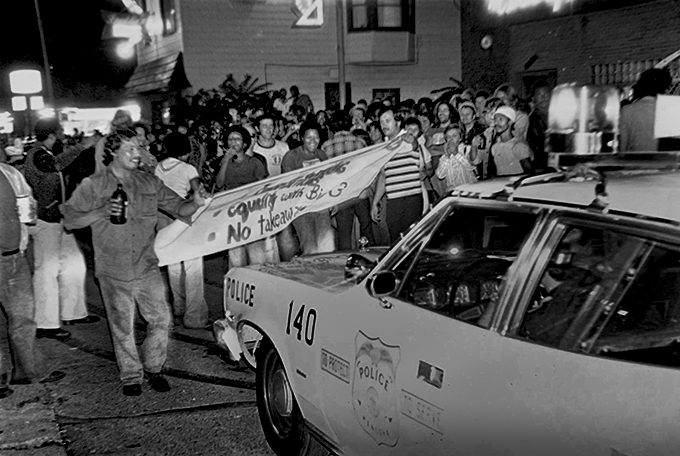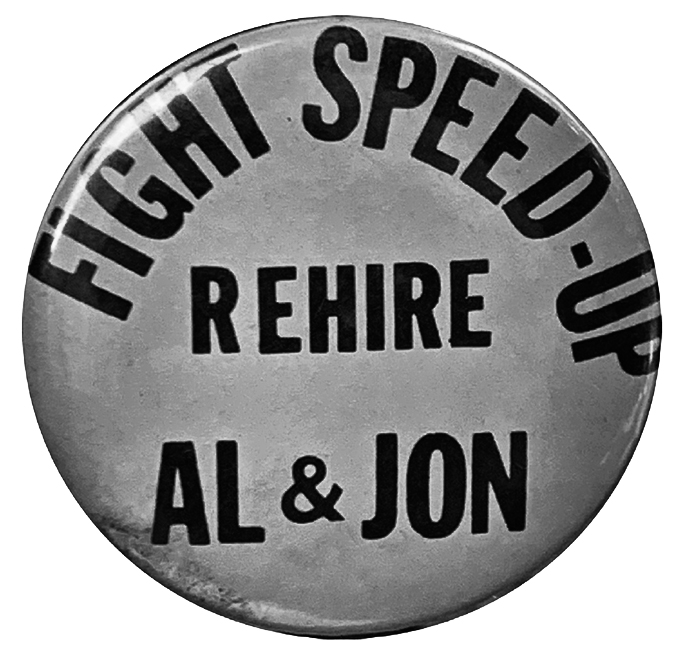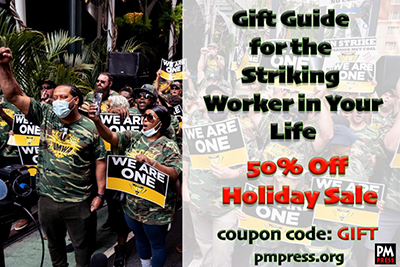Jon Melrod – Labor Lessons Learned
By Peter Olney
I reviewed Jon Melrod’s book, Fighting Times: Organizing on the Front Lines of the Class War, for In These Times—but I wanted to draw out more of Jon’s important lessons for the new generation of working-class organizers, so I sat down with him at his home in Northern California and interviewed him. Jon is a friend and comrade who continues to fight the good fight by advising young comrades on how to do working-class organizing. He has made connections with young organizers at both Starbucks and Amazon. He has much to say about how to conduct daily battles over the countless workplace abuses of capitalism and how to make the linkages between those skirmishes and the broader battle for democracy and against capitalism.
“you’ve got to be there for the long haul and you’ve got to be willing to roll with the punches.”
Jon Melrod
Peter Olney (PO): After your time as a student militant at the University of Wisconsin you decided to take a working-class job and organize up the road in Milwaukee. Tell us about the plant where you landed in 1972.
Jon Melrod (JM): I went to work at American Motors in 1972. In 1969 there had been 14 wildcats in one week at the Kenosha and Milwaukee American Motors plants. So I mean, you know, every time there was a grievance the Chief Steward, who was the Chief Steward of the whole factory, would say, “Let’s go on out until we get it settled.” And I have a great picture from 1973 of all these middle-aged white guys in Kenosha holding signs saying, “Wildcat strike,” “Paint Department on strike.” So I said this is the right place to be. If you wanted to be a rebel and you wanted to fight for something to change the world, you went to work at American Motors.
This was a very historic plant, the first auto plant organized in the United States. In 1933, a chief steward, a very left-wing militant named Paul Russo, went off his job to collect money for a worker whose house had been burned down. The foreman ordered him back on his job. And he said, “No, I’m taking a collection for a union brother who lost his house.” So they fired him. When they fired him, the whole Trim Department sat down. It was the first sit-down in auto, before Flint.
After that, the strike spread to Racine and Milwaukee and the Kenosha plant shut down. At that point, the company was forced to recognize officially the first union in auto and it was the first written contract in any auto plant in the United States. It was a one-page—basically just recognizing the union. But the way the union ran the shop was it was all past practice. So whatever we had established as past practice became the way that the relationship between management and the union functioned.
PO: How did you begin to establish your credibility at the plant?
JM: One of the things for new organizers today—and we’ll talk about this more—is people respect somebody who works hard, who’s willing to stand up for themselves, who’s not afraid of physical challenges. I’m not a very big guy and that really worked to my detriment. You know, the first leaflet we put out at the plant gate I was standing out in front of the door and fucking all of a sudden this bucket lands on my head full of cleaning fluid. And I’m covered in cleaning fluid. My eyes are stinging. And you know, I ran up – I knew where it came from because on the fourth floor in the Cushion room where they used to make the seat cushions, that was where the union hierarchy worked because it was easy. It was off the line and it was all white and they were all Korean War vets and they were all very conservative.
I came running up four flights of stairs and I ran into the Cushion room and I was, “Which one of you mother fuckers is chicken shit enough to dump something on my head when you can’t be seen?” And of course, everybody shut up and nobody said anything. But the fact that I stood up to them and that I was back out at the gate that afternoon handing out flyers to the second shift showed them.
It’s a rough and tumble world in the working class, you know? You’re not a student any longer writing papers for a living, you’re working for a living and you’ve got to stand up for yourself. And that became an important lesson many, many times from then on.
PO: So here you are in an auto plant and correctly focused, I think, on the battles that these workers are confronting day-to-day in their factory lives. How is there a connection between fight over drinking water and socialism?
JM: Well I think in every struggle in a factory, no matter how small or how large, there’s much larger implications. Because it’s really part of a class war. The title of my book is actually Fighting Times: Organizing on the Front Lines of the Class War. For example, they came around one Saturday and they said the president of the union has said that we need to get a Saturday of overtime in—there’s not enough cars in the dealerships. So mainly the young guys and I, we used to party hard every Friday and Saturday night. And we said damn, if we have to work on a Saturday, that’s the end of our partyin’ life. And I went and looked back at the contract, which was really this thick black book of probably 300 pages of codification of work rules, and it said you have the right to refuse overtime.
So, I went to the guys and I said, “Look, we don’t have to work overtime.” And we ran off copies of that page in the contract and handed it out. Next morning when they came through to tell everybody, “You’re coming in on Saturday; just want to make sure you know it; this is your notice,” everybody said, “We’re not coming in. We’ve got the right to voluntary overtime.”
And the word spread, and they couldn’t get a workforce, okay, and they were threatening to discipline people, they were threatening to fire people. People were saying we’ve got a right to voluntary overtime. Here again you have this class struggle that’s always at work. The company wants cars; you want a decent fucking life where you’re not a slave to your job. Capitalism means you’re a slave to your job, you know. With a militant union, at least you can put up a hell of a good fight. And they had to cancel the overtime.
PO: That’s a pretty rich tale Jon. Can you give us another example?
JM: Sure. The company announced they were going to speed up the assembly line. They were going to add about three cars an hour and not change our work assignments at all. Three cars an hour is a huge addition to the amount of work you have to do. And we put out a leaflet. Didn’t know what we were doing. We got an old mimeograph machine and we wrote up a leaflet that said, “Speed up kills. Fight speed up.” We handed it out and all of a sudden the factory was in an uproar, ’cause this woke up the old timers.
And the old timers said, “Do you know how we fight speed up? We ride the line.” I said, “What does it mean you ride the line?” They said, “That means you work to contract. You work no faster than the normal pace,” which was what was in the contract. “You can only be expected to work at a normal pace.” So, they taught us younger guys stay in the car until you finish your whole job, even if it pushes you two work stations down the line and that pushes four more people down the line. And meanwhile, it means that nobody’s getting their job done and everybody’s throwing the parts in the car, so there’s no cars that are getting built as a completed car. They’re all on the repair areas, stocked up.
You realized in doing that that there was a tremendous power that people had, that without your giving them the right to control your labor power you in fact have the power and that’s an important lesson that applies to society in general. You begin to realize that it’s workers that make all of society run and it’s capitalism that exploits workers to the benefit of the owning class.
PO: You got fired several times for your union work. In 1973, you ended up going to the NLRB. What happened?
JM: So, I went to the National Labor Relations Board and luckily the officer doing the interview was actually quite sympathetic. And I said all right, well we’ll see what happens. But even while I was fired I kept going to the plant basically every week to keep working with people, to help them with the 1974 auto contract. I stayed active. You know, I didn’t go home. The union told me go home and wait and we’ll see what happens. But I stayed active.
And about nine months later, the morning newspaper had a big article, “AMC ordered to rehire two fired workers,” and the Labor Board had ordered them to rehire me but in really strong language. The Labor Board blasted them for using McCarthy-like tactics to spread rumors that we were communists. And in fact, we had been engaged in protected activity.
So, they ordered me to be rehired. I now have a memo that the company and the FBI had collaborated on that they were not going to rehire me. They said, “No matter what the court says, we’re not rehiring Melrod. He’s too much trouble.”
But after two and a half years, the Seventh Circuit—that’s the Court of Appeals, the Federal Court of Appeals—ordered American Motors to rehire me. And at that point they really had no choice and they put me back to work.
PO: You said something that caught my attention when you said, you know, “After I was fired, I didn’t disappear. I’d show up at the plant.”
JM: One thing that I think is really important for young people to understand, particularly in this world where tweets are like 200 words and everything moves fast and there’s immediate satisfaction, you’ve got to be there for the long haul and you’ve got to be willing to roll with the punches. When I first ran for steward, I drove three guys in my car out to the voting in the union hall and I was the fourth. And the next morning I went to look at the bulletin board where they listed the returns on the steward election, and my name was on the very bottom. I only had gotten three votes. One of the guys I drove didn’t even vote for me.
And it was pretty demoralizing. I mean, I kind of slunk away, you know, from the crowd looking at the returns and I had a day to think about it. And it led me to a lot of important conclusions. ‘Cause you’ve always got to be thinking about what you did right and what you did wrong. And one of them was that I had not been involved enough in the day-to-day fights. In other words, I was always at the gates with the Milwaukee Worker and political flyers. We organized people to go to May Day. We organized people to march against the Ku Klux Klan in Tupelo. And that’s all good and that’s important to bring in those political issues. But if you want to represent people, they’ve got to see that you’re going to stand up to the company.
And from that day on I said I don’t care if it’s a spill of grease on the floor, I’m going to make a fight about it or I’m going to start a petition about it or I’m going to get a group of workers to go confront management on it. Because it doesn’t happen overnight. You don’t get elected the first time. You don’t always win the union vote the first time. You know, I mean, this is serious business and if you’re trying to fight a serious class enemy that’s determined to keep unions out and to keep wages down and to keep people working for as many hours a day as they can, you know, then you’ve got to be ready to throw down and take that on.
PO: When you were in the UAW, you began what would be a long fight for “one member, one vote” in the union. Leaders of the union were historically chosen at convention by delegate votes rather than direct election by the members: one member one vote.
JM: In 1983 we were running a slate for the convention, International UAW convention, and we looked around to figure out what was the most important issue that broadly affected locals around the country. And we decided it was the issue of democracy in the union, because if you don’t have the right to vote for international officers, you have an autocracy. And [UAW President Walter] Reuther was able to build something called the Administration Caucus, and everybody who made it to the top leadership had to be a member of the Administration Caucus and even to be an international rep. At that time there were about 350 full time international reps in the UAW had to be a member of the Administration Caucus.
PO: And even regional directors, right?
JM: And even regional directors. So we took that issue to convention. Earlier we had helped form Locals Opposed to Concessions, LOC, with militant locals in Detroit. And those locals had opposed concessions at Chrysler and at GM and at Ford. And we had developed relationships with the leadership of those locals. So we really went out to them to build this movement for one member, one vote. And for them it wasn’t just a matter of winning the rank and file’s right to vote, but it was also a way to punish the International Union for having granted concessions.
So, we took it to a membership meeting and everybody in the local supported it. There were a thousand members at that meeting who voted to write a resolution to be delivered to the convention Resolutions Committee supporting the concept of one member, one vote. With that vote of the membership was also an endorsement that Local 72 out of Kenosha lead a national push to establish one member, one vote.
Once it became the official position of the union, the local gave us a budget of $100,000, which in ’83 was a lot of money. And we forced the International to give us a mailing list of all the locals in the country, and we spent hours and hours sending out letters to every local, to every convention delegate, local—the head of their delegation would receive a letter asking them to pass resolutions supporting one member, one vote.
And it took off fairly well, particularly in Canada. When we got to the convention there was enough support that even thought the International would’ve liked to shelve the whole issue, they were forced to agree to bring it to the floor. So I was able to present a very long, detailed resolution on why it was so important that the membership had the right to vote, and if we had been part of the Civil Rights Movement like the UAW had, why couldn’t we apply that to the local’s membership right to vote. Afterward [then-UAW President Douglas] Fraser called the question and put it to a voice vote and we probably had around—he said 300—it was probably around 500 delegates who did vote for the resolution. And I remember how proud I felt when Fraser told the media that was the most difficult fight the International has had to rally its representatives to do battle on.
It laid the groundwork later for, as you mentioned, Jerry Tucker, and I believe it was New Directions that brought it to the convention in ’86. And now most recently, after they sent 11 of the International officers to jail for all kinds of horrible crimes of embezzlement and working with Chrysler and being paid by Chrysler, the membership decided enough is enough and a legal case was brought and a vote was held on whether we’d switch to the referendum system, which we did, and as you said, right now the membership is finally voting.
PO: Yeah, pretty exciting.
JM: It is pretty exciting, and it portends well for changing the responsibility of the leadership to the membership ’cause there isn’t that, you know, buffer between them any longer.
PO: How do reflect now on your approach to politics then? Milwaukee has a system of wonderful public parks. Where did that come from and would that have been a political reference point, the Sewer Socialists, the Victor Bergers, open socialists elected to Congress in the 1910s and ‘20s? Could we have had a much more organic relationship between the battles we were waging on the shop floor and municipal and state and federal politics and power?
JM: I think you’re raising a really good point. That is something that I’ve looked back upon and been critical of myself. I think that our political viewpoint was basically elections don’t matter, politicians don’t matter. Be it on a local level or a national level, it’s just not something that we involve ourselves in. And that was a huge mistake because as you say, Milwaukee had been a socialist bastion up until maybe even the early ‘60s. And you’re right. It had one of the nicest park systems in the United States and that was because the socialists had created that. And it also had at that time a very good public school system that had been created by the socialists. And we really ignored that whole part of history to our own detriment and to the detriment of our political organizing.
I mean, right now, for the first time in 80 years, two socialists, open socialists, have been elected from Milwaukee to the state assembly. Now this is the same state where they’ve got Ron Johnson, the arch-Republican autocratic, drink Listerine and it’ll fight COVID, as their senator. So, you’ve got a real dichotomy going on right now between a rebirth of political left-wing progressive organizing and a very powerful right wing. And part of the problem is that the unions don’t have the strength that we once had in Wisconsin, because were the unions in power there wouldn’t be such a movement for Trump. I believe this 100%.
PO: Now we have an African American named Mandela Barnes running for Governor of Wisconsin?
JON: Mandela Barnes, I’ve heard him speak. He’s a very progressive guy. He’s part of this new wave of younger progressive, fair-minded politicians. Both his parents came out of unions. Both his parents were workers, came from the heyday of the union movement in Wisconsin, and he’s definitely got a very different orientation than the Republican candidate.
The fact that this local endorsed Mandela Barnes through their political organization in the UAW shows you that it makes a big difference when you have a union that teaches people the strength of the power of unions and the power of working people politically. It’s not like we didn’t talk about history in our day. We talked about history but it was about Harold Christoffel, who had been the President of the Allis-Chalmers Union, had formed the union actually at Allis-Chalmers and led the longest strike, which went on for one year, at the Allis-Chalmers plant outside of Milwaukee. And he was a communist and during the McCarthy period he refused to respond and was given a year in jail. Now we talked a lot about him and Allis-Chalmers but we didn’t talk about it in the context of, you know, local elections, city elections, and that was a mistake on our part.
PO: Thank you Jon for your time and mostly for writing this very useful book. I hope readers of Convergence and the Stansbury Forum will pick up a copy from: PM Press.
50% off with Holiday sale: coupon code: GIFT
Fighting Times: Organizing on the Front Lines of the Class War, by Jon Melrod. PM Press, 2022
This has been a joint Stansbury Forum – Convergence post. We urge you to look at Convergence’s site for some amazing reads
…



